
Ronald Lipsius (Courtesy the Press-Citizen)
Ronald F. Lipsius
Homicide
Ronald F. Lipsius
30 YOA
812 S. Summit St.
Iowa City, IA
Johnson County
May 16, 1966
Case Summary compiled by Jody Ewing
Ronald F. Lipsius, a 30-year-old Iowa City grocer, was shot to death on Monday, May 16, 1966 as he chased a woman bandit who’d just scooped $35 from a cash register in his 812 South Summit Street store.
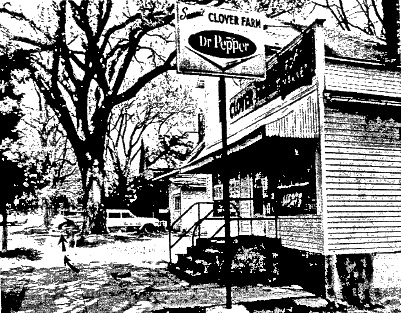 Courtesy photo Iowa City Press-Citizen
Courtesy photo Iowa City Press-CitizenThe 812 S. Summit St. grocery Lipsius owned and operated in Iowa City. The sidewalk arrows mark the direction in which Lipsius chased a young woman who’d stolen cash from his register while he sliced the ham she’d ordered.
According to published reports, a young woman entered the Clover Farm Food Market at about 8:30 a.m. and asked for some sliced ham. While Lipsius began slicing the meat, the woman snatched the money from the cash register and then fled north on foot.
Lipsius — a married father with three young children under age three and a new baby on the way within two weeks — chased the woman down the sidewalk. At the corner, she turned and fired a shot at Lipsius but missed.
When she began running east, Lipsius followed. He’d almost caught up with the scarf-wearing bandit when she turned and fired two more shots — at close range — with a .22-caliber pistol. According to the Iowa City Press-Citizen, one shot tore through Lipsius’ right forearm and the other hit him in the chest, severing his pulmonary artery.
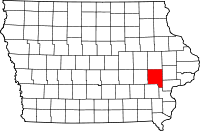
Johnson County in Iowa

Iowa City in Johnson County
Sheridan street resident Beatrice Schwab heard the pops of what she thought was a toy gun, and after seeing Lipsius on the ground, went to his aid. She yelled for another woman to call police.
Several people who’d witnessed the robbery-shooting described the female bandit as being in her early twenties, 5′ 09″ and weighing around 175 pounds. They said she wore jeans, a headscarf and horn-rimmed glasses. The woman and an unknown male got into a 1957 Pontiac, white over black, shortly after the woman shot Lipsius.
The Iowa City Police Department developed a composite drawing based on eyewitness reports, and released the sketch in hopes that someone in the area might recognize the woman and notify authorities.
Police brought in for questioning at least two women who matched the description, and though one submitted to a polygraph test, neither woman was ever arrested.
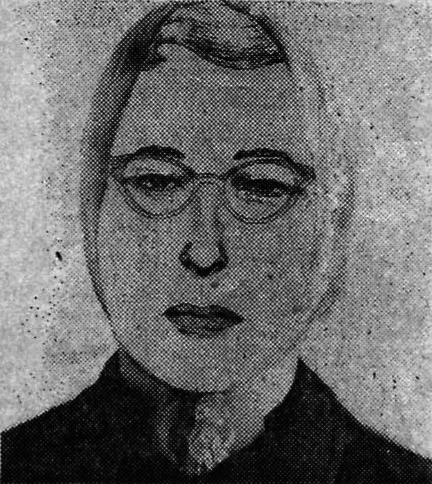 Courtesy Iowa City Police/The Gazette
Courtesy Iowa City Police/The GazetteIowa City police released this sketch of the alleged “woman” who stole $35 from Lipsius’s cash register and then shot him after he gave chase.
The case eventually went cold, until an anonymous tip gave investigators renewed hope. A mistake in another state would soon leave Iowa authorities without a suspect to extradite, and a case still unsolved.
Local murder suspect arrested, released in California
Ten years after Lipsius’ slaying, Iowa City police received an anonymous letter from a person in the Quad Cities who said they recognized the woman from the composite drawing previously released in their newspaper. The writer said the knowledge had eaten at her conscience for 10 years, and she provided police with the name of a woman who resembled the woman in the sketch.
According to a Press-Citizen article published Nov. 5, 1976, the anonymous tipster also said the woman had been placed on probation by a Scott County judge in 1962 following a conviction on an attempted murder charge. The letter writer believed the woman’s probation was subsequently revoked, but said the woman had never been recaptured.
The letter writer said she knew the woman had relatives in Norwalk, Calif., and believed she might have gone to live with them. According to the Press-Citizen story:
An Iowa City police detective and an assistant Johnson County Attorney went to Davenport and obtained court records that verified the anonymous writer’s story.
They also obtained a booking photo of the woman, which closely resembled the composite drawing of the murder suspect, and had the 1963 probation violation fugitive warrant for the woman reactivated on the National Criminal Information Computer.
The renewed fugitive warrant was issued Sept. 24, and on Oct. 29, fugitive warrant deputies in Norwalk, Calif., apprehended the woman on a traffic violation.
The woman paid a $65.50 fine on the traffic charge, and was then arraigned on the fugitive warrant from Iowa, the Press-Citizen said. Bond on that warrant was set at $10,000.
On Monday, Nov. 1, 1976, the woman posted 10 per cent of that figure through a bail bondsman — and was released.
Officials back in Iowa didn’t understand why the suspect had been released since she’d been sought on a fugitive warrant, which normally directs that the person arrested be held without bond.

Courtesy Iowa City Press-Citizen, Nov. 5, 1976
Johnson County attorney Jack W. Dooley told the Press-Citizen he’d be contacting California authorities to seek the suspect’s whereabouts and said he might ask Scott County authorities and Iowa Bureau of Adult Corrections extradition officers to return the woman to Iowa if she could be found.
“The problem is, we can’t extradite the woman as a suspect,” Dooley said. “We have to seek her return on the fugitive warrant [from Scott County]; then we could question her.”
That wasn’t going to happen any time soon; Norwalk, Calif. deputies said they had no address for the woman.
A precursor to the DCI’s new Cold Case Unit
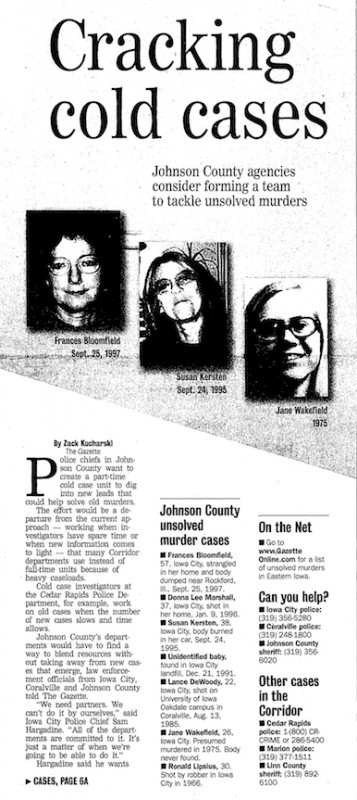 Courtesy Cedar Rapids Gazette
Courtesy Cedar Rapids GazetteThis Dec. 12, 2006 Gazette article notes that investigators recognize the need for a Cold Case Unit.
In a December 12, 2006 article published in the Cedar Rapids Gazette, Iowa City Police Chief Sam Hargadine said Johnson County agencies were considering forming a part-time cold case unit to tackle unsolved murders. Investigators normally worked old cases when time allowed, and the new approach would rely on blending resources without taking time away from emerging new cases.
“We need partners. We can’t do it by ourselves,” Hargadine told the Gazette. “All of the departments are committed to it. It’s just a matter of when we’re going to be able to do it.”
Hargadine proposed assigning one investigator from each involved Johnson County department and the Iowa Division of Criminal Investigation (DCI) to a team that would work for a set time…perhaps three months. In order to avoid distractions, the investigators would be assigned to work in a rented office away from their regular departments. There, they could review evidence and crime scene photos, reinterview officers and investigators, revisit witnesses and see whether evidence, such as blood, can be reviewed for DNA or other forensic clues, reported the Gazette.
Said Hargadine:
“Whatever it takes to shake new leads loose. Most of the cases I’ve seen go this route were pretty close to the guy all along. It turns out they did interview the guy, they just didn’t have enough to focus in on him. It’s amazing how close you come sometimes, but don’t realize it.”
Other Iowa law enforcement departments also recognized the state’s need for a team of cold case investigators, and by early 2009 — through federal grant funding — the DCI had a new Cold Case Unit up and running. Special agents pored over more than 150 case files — some whose documentation filled several thick binders — tracked down individuals still living and began the re-interviewing process. They also began re-submitting original evidence for additional forensic testing.
The Cold Case Unit’s arduous but potentially rewarding journey was just hitting its stride; advanced DNA testing methods were producing profiles and being entered into CODIS (the Combined DNA Index System). Federal grant funding was exhausted by December 2011, and the DCI was forced to close down the Cold Case Unit.
The DCI remains committed to resolving Iowa’s cold cases. They continue to assign agents to investigate cases as new leads develop or as technological advances allow for additional testing.
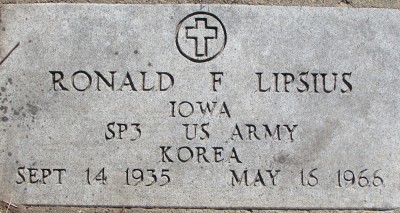 Courtesy photo Gerry Lipsius, findagrave.com
Courtesy photo Gerry Lipsius, findagrave.comRonald Lipsius is buried at Saint Joseph Cemetery in Iowa City.
About Ronald Lipsius
Ronald F. Lipsius was born September 14, 1935, in Williamsburg, Iowa, to Mae Ruth (O’Brien) and Frederick A. Lipsius.
He married Rose Marie Cortimiglia on December 27, 1961 at St. Mary’s Church in Iowa City.
The couple had three children, all under age three, and Rose — a lifelong Iowa City resident who worked as an orthoptic technician at the University of Iowa Hospital and Clinics — gave birth to the couple’s fourth child two weeks after her husband’s death.
 Courtesy photo Iowa City Press-Citizen
Courtesy photo Iowa City Press-CitizenRose Lipsius passed away in July 2011 at age 77.
Prior to opening the Clover Farm Food Market in Iowa City on April 1, 1965, Lipsius worked for five years as a meat cutter for the A&P supermarket.
In addition to his wife, Rose, Ronald Lipsius’ survivors included his [four] children, Susan Marie, 3, Richard James, 2, Daniel John, 1, and the yet-unborn infant, Carol; his parents; two brothers, Robert and Gerry; and two sisters, Joyce and Donna.
Ronald Lipsius was buried at Saint Joseph Cemetery in Iowa City in Johnson County.
Rose Lipsius passed away July 13, 2011, without ever seeing her husband’s killer brought to justice. She was buried in Saint Joseph Cemetery next to her husband.
Information Needed
The DCI remains committed to the resolution of Iowa’s cold cases and will continue to work diligently with local law enforcement partners to bring the perpetrators of these crimes to justice for the victims and their families.
If you have any information about Ronald Lipsius’ unsolved murder please contact the Iowa City Police Department at 319-356-5275 or email the Investigations Division at investigations@iowa-city.org. You may also contact the Iowa Division of Criminal Investigation at (515) 725-6010 or email dciinfo@dps.state.ia.us.
Sources and References:
- “IC HISTORY: REEXAMINING THE COLD CASE FILES,” by Marlin Ingalls, Little Village magazine, October 25, 2013
- Johnson County Sheriff Lonny Pulkrabek, correspondence to Iowa Cold Cases, March 26, 2013
- Iowa City Police Department
- Iowa Division of Criminal Investigation
- Ronald F. Lipsius (1935 – 1966) – Find A Grave Memorial
- Rose Marie Cortimiglia Lipsius (1934 – 2011) – Find A Grave Memorial
- “OBITUARIES: Rose Marie Lipsius,” The Cedar Rapids Gazette, Friday, July 15, 2011
- “Obituaries: Rose Lipsius, 77,” The Iowa City Press-Citizen, July 14, 2011
- “Cracking cold cases: Johnson County agencies consider forming a team to tackle unsolved murders,” by Zack Kucharski, The Cedar Rapids Gazette, December 12, 2006
- “Cold Cases: Technology, tips help clear old homicides, but time takes toll on investigations,” by Christoph Trappe, The Cedar Rapids Gazette, September 21, 2003
- “Murder Suspect Will Not Be Extradited,” The Cedar Rapids Gazette, Saturday, November 13, 1976
- “Murder suspect’s extradition unlikely,” The Iowa City Press-Citizen, November 12, 1976
- “After 10 Years, Suspect in Iowa City Murder Lost,” by Ford Clark, The Cedar Rapids Gazette, Saturday, November 6, 1976
- “Local murder suspect arrested, released in West,” by Jim R. Mullendore, The Iowa City Press-Citizen, November 5, 1976
- “Unsolved Iowa killings: friends ‘still feel scars’,” by Nick Lamberto, The Des Moines Register, Sunday, September 8, 1974
- “List of ‘case open’ slayings in Iowa,” by Nick Lamberto, The Des Moines Register, September 8, 1974
- “Officers Brighten Yule of Slain Man’s Family,” The Cedar Rapids Gazette, Saturday, December 24, 1966
- “Clues melt away, but police push probe of Lipsius case,” The Iowa City Press-Citizen, July 6, 1966
- “Say Abandoned Car not the One In Lipsius Killing,” The Cedar Rapids Gazette, June 5, 1966
- “Hard-Working Police Forces Need Men,” by Phyllis Fleming, The Cedar Rapids Gazette, Sunday, June 5, 1966
- “Woman Sought,” artist’s drawing of a woman sought in connection with slaying of Ronald F. Lipsius, The Associated Press / Cedar Rapids Gazette, Sunday, May 29, 1966
- “Lie detector eliminates suspect in Lipsius case,” The Iowa City Press-Citizen, May 28, 1966
- “NEW LEAD IN GROCER DEATH,” The Des Moines Register, Friday, May 27, 1966
- “Look for Pontiac in Iowa City Murder,” The Cedar Rapids Gazette, Thursday, May 26, 1966
- “Lipsius Fund Turned over to Family,” The Iowa City Press-Citizen, May 21, 1966
- “2 Questioned in Lipsius Slaying,” The Iowa City Press-Citizen, May 18, 1966
- “Grocer Killed by Woman Bandit,” by Nick Lamberto, The Des Moines Register, Tuesday, May 17, 1966
- “Robber got only $35 in theft-killing,” The Iowa City Press-Citizen, May 17, 1966
- “Services for Slain Grocer Wednesday,” The Cedar Rapids Gazette, Tuesday, May 17, 1966
- “Woman Bandit Kills Grocer Here,” The Iowa City Press-Citizen, May 16, 1966
- “GIRL BANDIT SLAYS GROCER: Iowa City Father of 3 Is Shot,” The Cedar Rapids Gazette, Monday, May 16, 1966


 Courtesy photo Iowa City Press-Citizen
Courtesy photo Iowa City Press-Citizen
 Iowa City in Johnson County
Iowa City in Johnson County Courtesy Iowa City Police/The Gazette
Courtesy Iowa City Police/The Gazette

 Courtesy photo Gerry Lipsius, findagrave.com
Courtesy photo Gerry Lipsius, findagrave.com Courtesy photo Iowa City Press-Citizen
Courtesy photo Iowa City Press-Citizen
I am surprised that the information given regarding Ms Christopher now Mrs. Slaughter has not been looked into.
Mr. Knapp, thanks for the information you submitted. However, the names you provided are nice, but law enforcement needs further information on these two individuals. Thus would include a date of birth, also what information that you might know that connects them to the crime. Besides having a criminal history, for this type of crime.
One of the other problems in this case, is that the original murder took place in 1966. Then the letter naming the woman, came in 1976. We don’t know if the original case reports still exist. Also, do they still have any physical evidence, such as fingerprints, shell cases, etc.
Also, a district attorney has to look at the evidence and say yes or no to approving charges.
The couple were Catherine Christopher Slaughter and Rodney Layne Johnson. Both were U of I students.
Thank you for sharing this info, James Knapp. I know the victim’s family.
Praying they catch this killer!
His wife Rosie and I were friends for many years. She raised the kids by herself. Would be nice to catch this cold hearted person
Was that little store on a corner?
Was that little store on a corner?
Shared
Thanks, Alice!
Jack Toomey, knowing her name would definitely help, but as far as I know, officials never released it to the public. (Not even in the Nov. 5, 1976 long article that spoke of her relatives in Norwalk, Calif.)
So what is her name? Wouldn’t that help?
so sad, wish this could be solved! prayers to the family.